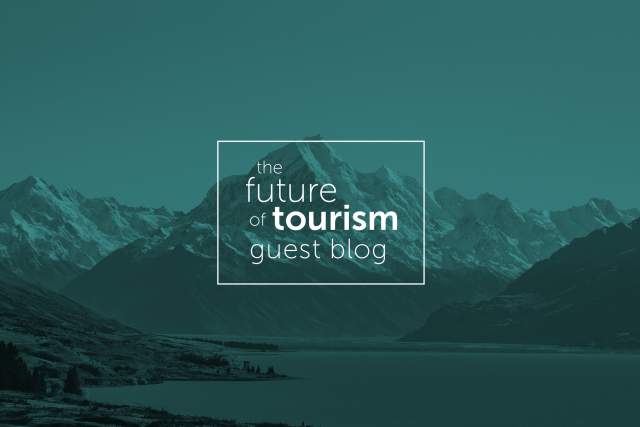Future of Tourism Series | Guest Blog
By Rodney Payne
For travel, decarbonization will be at least as disruptive as was the internet.
The world is finally turning toward the climate crisis with coalitions, technologies, policies and economic incentives that are needed to coordinate the effort to decarbonize. Leaders in the travel industry must get ahead of the climate reckoning that is coming, even as the pandemic continues to flatten tourism in so many places.
If you didn’t have a pandemic readiness plan, 2020 probably caught you off-guard, as it did most organizations. Many destination marketers have listed global crises on their SWOT assessments, but few were prepared for the extent of the travel shutdown or the enormous human impact caused by the virus. Necessary health precautions have led to restrictions on movement, grounded airlines and shuttered tourism businesses.
Devastating as COVID-19 has been, it is one crisis sitting atop a much larger one: the climate emergency. The world has had ample warning. Still, the impact of accelerating climate change will require much of the tourism industry to fundamentally change the way it does business to reduce greenhouse gas (GHG) emissions in line with global targets.
Progress toward decarbonizing tourism has been incremental at best, but recent, radical public policy changes show that some governments are working to catch up. New Zealand is introducing plans to reduce economic risks by making climate-related financial disclosures mandatory among large insurers, banks and publicly traded companies. Other decisions also directly affect travel. The French government, for example, has banned domestic flights that could be traveled via train in under two-and-a-half hours.
Public support for climate action is also growing. The inaction following the 2015 Paris Agreement was one catalyst for climate strikes that have galvanized support from millions of people across 185 countries. Popular uprisings like "Fridays for Future" or "School Strike for Climate" have nudged sustainability further into the mainstream.
A low-carbon future is coming, ready or not.
Travel will play a pivotal role in the necessary changes ahead, and leadership and participation from destinations like yours will be vital. COVID-19 has shown, briefly, what a world without air travel or cruises looks like. It has revealed the travel industry’s vulnerabilities.
Many economies are dependent on tourism income, and while imagining the world without travel is a scary prospect, tourism itself is not essential for human survival. Public policymakers can, at a moment’s notice, heavily regulate travel to restrict movement in support of a greater public good.
Today’s travel restrictions were designed to halt the spread of disease. Imagine, though, what might have been possible with the benefit of preparedness. Might some destinations have lessened their reliance on international visitors and moved toward a more balanced business mix? Local cases vary, but one of 2020’s most powerful lessons is that today’s planning is tomorrow’s gain.
Climate change will continue to shape public policy. If your DMO does not have a plan to align its tourism industry with the Paris Agreement, the impact will be steep. COVID-19 has provided pause to think about how your destination will emerge and build resilience into that recovery.
Today, destination leaders have strategic choices to make. Here are a few examples:
Partnerships – Find out how your DMO can join the growing cohort of those committed to proactive change. Visit Scotland is among the 230+ signatories to declare a climate emergency with Tourism Declares. A further 500 organizations representing a cross-section of the travel industry have signed onto the Future of Travel Coalition’s guiding principles.
Product development – New technologies for reducing fossil fuel consumption will also lead to partnership opportunities. All-electric and hydrogen-electric commercial aircraft will soon be in use. Hyperloop projects may make rapid travel far more efficient. Which airports or cities will be the first to attract innovations like these? Meanwhile, United Airlines has invested in carbon sequestration technology with the potential to create jet fuel from thin air, and Intrepid Travel has been leading natural sequestration solutions through their Giant Kelp investments.
Markets – In a climate-changed world, are your destination’s legacy source markets still the right ones? Though controversial, destinations like Hawaii Tourism Authority and Tourism New Zealand are shifting strategy toward high net-worth visitors in the ecotourism space. Other options may include focusing on near-in markets.
Leadership – Has your destination completed an assessment of its carbon footprint? Before long, success might be measured by metrics like a destination's greenhouse gas levels per traveller or per travel/tourism dollar spent. Your destination can actively work to reduce emissions and help your country, state or province align with targets set by the Paris Agreement. Several nations have written net-zero emissions targets into law, including France, Hungary, and the U.K. A key part of leadership is education. Are you adequately informed on the state of our climate and resulting implications for your business?
Reputation – Many destinations rest their brand on their natural environment. Are they living up to that promise? The stance your leaders take toward decarbonization will affect your place’s reputation. Consider the implications for your brand as demand for climate action grows. Destinations that genuinely take the lead on this through action will benefit.
Organizations – What skills will your DMO need to compete and lead in these areas? This may be the time to reevaluate, because the timeline for decarbonization is getting shorter. For example, as destinations reliant on long-haul flights or cruise ships reckon with the move toward low-carbon transport, their leaders will need to be familiar with CORSIA, the international project to account for GHGs emitted from international air travel.
Many places need a strategic renewal, and Destination Think is working with some DMOs to adjust their strategies to align with Paris Agreement targets or succeed beyond them. If you are just beginning to think about how climate change will disrupt our industry, welcome. But don’t delay too long. Be aware that many nations and coalitions are moving fast on climate to make up for lost time, including the E.U., Japan, Germany, and now the U.S. under President Joe Biden.
Watch the financial indicators. Biden’s proposed $2 trillion American Jobs Plan aims to make the U.S. a global leader when it comes to sustainability and green technologies by focusing on climate-related infrastructure investments. We have already seen the soaring share prices of companies like Tesla, QuantumScape and ChargePoint. The price of a carbon credit, too, increased 35% in 2020. The biggest carbon emitters will have the biggest bills to pay, which means carbon-free emissions will soon be prized.
The world is about to decarbonize whether you are prepared or not. This may feel overwhelming and discouraging, but decisive action on climate is, at this point, the only way toward long-term prosperity. The future of tourism must contribute to that prosperity for people and the planet. At Destination Think, this is the future we want to be a part of. This is what we are working on while the pandemic keeps us at home. This is the future we can create together.


Rodney Payne
Partner & Chief Executive Officer at Destination Think
Rodney is the founder and CEO of Destination Think and has led the business for over a decade. Rodney built his company on a challenger spirit – a spirit based on passion, humanity, innovation and a belief that travel has the potential to make the world a better place.
Destination Think, an international consultancy and agency, works with the most innovative and progressive destination marketing organizations on the planet. The company has successfully delivered thousands of branding, strategy, campaign, content marketing and sustainability-related projects for destinations all over the world.
An ardent supporter of climate solutions, Rodney is also a Founding Partner at Creative Destruction Lab (CDL)’s Climate Stream in Vancouver, Canada. CDL supports startup founders to accelerate innovations that will be needed to tackle humanity’s most imminent and existential challenge.
Stay up to date on industry trends.
Subscribe to the Simpleview newsletter to get the latest articles and podcasts delivered straight to your inbox.
Sign up

Rodney Payne
Partner & Chief Executive Officer at Destination Think
Rodney is the founder and CEO of Destination Think and has led the business for over a decade. Rodney built his company on a challenger spirit – a spirit based on passion, humanity, innovation and a belief that travel has the potential to make the world a better place.
Destination Think, an international consultancy and agency, works with the most innovative and progressive destination marketing organizations on the planet. The company has successfully delivered thousands of branding, strategy, campaign, content marketing and sustainability-related projects for destinations all over the world.
An ardent supporter of climate solutions, Rodney is also a Founding Partner at Creative Destruction Lab (CDL)’s Climate Stream in Vancouver, Canada. CDL supports startup founders to accelerate innovations that will be needed to tackle humanity’s most imminent and existential challenge.

